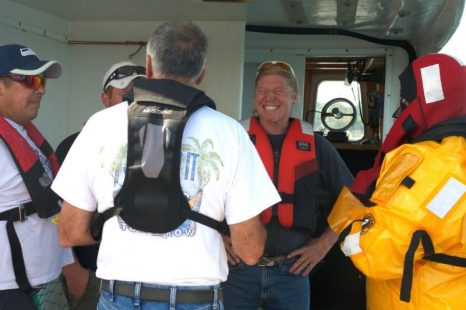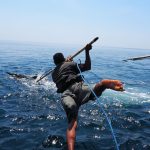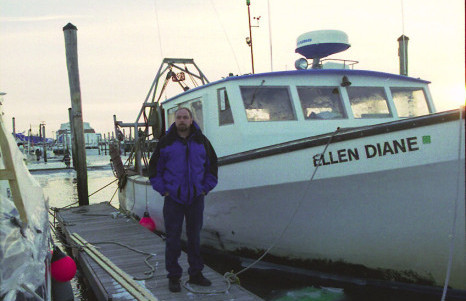Tag Archives: Fisheries Safety Association of Nova Scotia
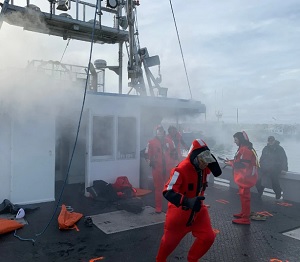
Neglected safety gear on fishing boats endanger fishermen – If it’s not maintained, it’s likely not going to work
“It’s one thing to go out and buy all this for your vessel, but if it’s not maintained it’s likely not going to work for you when you need it,” said Matthew Duffy, a safety adviser with the association. Duffy has seen survival suits full of holes, rotted ropes, and life rings tied so tightly they couldn’t be used. “We did a man-overboard drill where we got the crew involved and they got their immersion suits out,” said Duffy. “One crew member opened it up and there was a squirrels’ nest in one of them, you know, chewed right through the suit,,, >click to read< 07:40
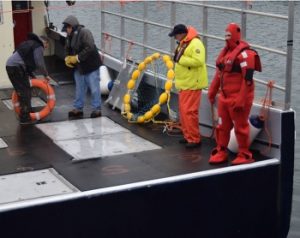
Huge emphasis placed on safety ahead of lobster season opener in southwestern N.S.
Throughout the fall, the ‘Are You Ready’ team has been busy visiting wharves throughout LFAs 33 and 34, conducting safety drills and sharing resources and knowledge to help ensure fishermen come home safely at the end of the day. “In general, especially leading up to the season fishermen already have safety on their minds,” said Matthew Duffy, safety advisor for the Fisheries Safety Association of Nova Scotia (FSANS). >click to read< 10:39
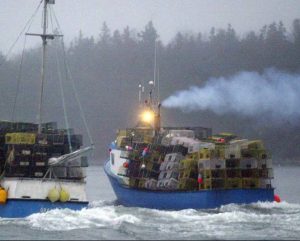
Already the most dangerous profession, drug and alcohol use an increasing problem on fishing boats
One of Canada’s largest and most lucrative fisheries appears to be facing a growing drug problem, with sources saying drugs ranging from cannabis to cocaine have become increasingly commonplace on fishing boats off Nova Scotia’s southwest coast.,,, “Drugs and alcohol are a big issue,” said Stewart Franck, former head of the Fisheries Safety Association of Nova Scotia. “It adds another dimension to the level of risk.” >click to read< 12:09

Cocaine use a growing problem on fishing vessels, says industry rep
“It’s everywhere — in all the ports,” said Hubert Saulnier, who fishes out of Meteghan, N.S., and is on the drugs and alcohol committee of the Fisheries Safety Association of Nova Scotia. “You hear about it a lot … It’s an ongoing issue and it’s getting to be a little bit worse.” Saulnier said he hears of cocaine use at sea from fishermen themselves, as well as from the RCMP and the federal Fisheries and Oceans Department. He believes some fishermen may use hard drugs in part to increase their endurance and productivity during long trips, which can last 48 hours or more. >click to read<11:44
No wonder there’s a problem! – Deep sea fishermen pull in big catch of cocaine, worth nearly $1M, off Charleston coast >click to read<
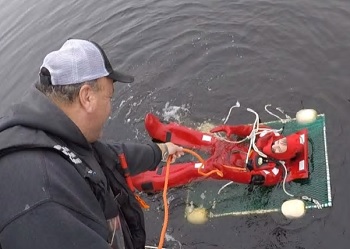
Fishermen train for a rescue in an industry full of danger
The thick red neoprene of my survival suit pressed my nose flat against my face, as I flopped into the makeshift rescue rig. A winch above strained to pull me from the dark water. The rope snapped. I plunged back down, spat out salty water and bobbed to the surface. “And that’s why we do the drills,” said Matthew Duffy, a safety advisor with the Fisheries Safety Association of Nova Scotia. Duffy stood on the boat above me in Port Mouton, N.S., next to a sheepish captain who later vowed to buy a new rope. On an adjacent wharf, dozens of fishermen watched our mock rescue. >click to read<12:41
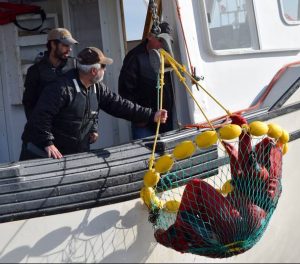
Southwestern NS fishermen asked ‘Are you ready?’ as focus is put on safety heading into season
The Fisheries Safety Association of Nova Scotia and the Nova Scotia Fisheries Sector Council have been busy in the weeks leading up to the opening of the lobster fishery delivering man overboard drills, safety equipment demonstrations and safety messages at wharfs throughout southwestern Nova Scotia as part of their ‘Are You Ready?’ program. “Attendance at these drills has been fantastic, even in smaller ports for 10 or less vessels we are still seeing all captains and crews show up,” said Matthew Duffy, safety advisor for the Fisheries Safety Association of Nova Scotia. >click to read<10:53
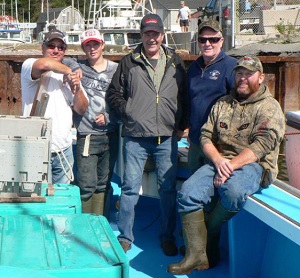
Devestation – Seven drownings among Nova Scotia fishermen highlight importance of PFDs
Allan Anderson never thought his close friend, “a stellar tuna fisherman” of four decades, would be the latest drowning victim. The Aulds Cove lifelong fisherman learned of the tragic news on Saturday not long after Stevie MacInnis died while tuna fishing off the coast of Port Hood. The father of three was the seventh Nova Scotia fisherman to drown on the job this year. The 68-year-old Arisaig resident was widely regarded as a selfless community man. It’s unclear whether he was wearing a personal flotation device (PFD).,, But Anderson also admits that he and MacInnis also represent an older generation of fishermen reluctant to wear PFDs themselves. >click to read<12:18
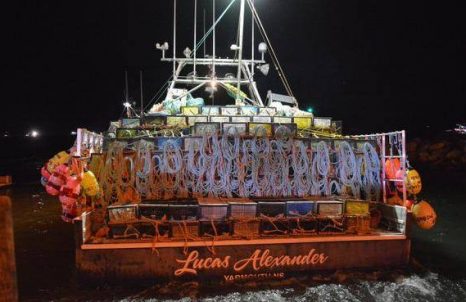
Safety culture a priority on the water
Efforts to improve the safety culture among Nova Scotia fishers seems to be paying off. Although we still don’t know the condition of the crewmember airlifted from a lobster fishing vessel off southwest Nova Scotia Wednesday, after having convulsions, the smooth way that operation went — along with another incident where a crew were successfully rescued after having to abandon ship — points to captains and crew being more than ready for emergencies. click here to read the story 12:02
Yarmouth Sea Products outlines extensive safety steps taken following serious injury to crewmember in 2015
 It was just supposed to be another ordinary fishing trip, except that on the water things don’t always happen the way they’re supposed to. But that can change. An accident onboard the scallop dragger Compass Rose II in June 2015 left a crewmember (Clayton Joudrey) with permanent injuries. In a room of fishermen and others 28 months later, the owners of that vessel, Yarmouth Sea Products Ltd., gave a presentation on the extensive safety steps that have been undertaken to prevent such an accident from happening again. The presentation was ordered by the court as part of the penalty,,, click here to read the story 13:43
It was just supposed to be another ordinary fishing trip, except that on the water things don’t always happen the way they’re supposed to. But that can change. An accident onboard the scallop dragger Compass Rose II in June 2015 left a crewmember (Clayton Joudrey) with permanent injuries. In a room of fishermen and others 28 months later, the owners of that vessel, Yarmouth Sea Products Ltd., gave a presentation on the extensive safety steps that have been undertaken to prevent such an accident from happening again. The presentation was ordered by the court as part of the penalty,,, click here to read the story 13:43

Sea Change – The Struggle for Safety in Fishing, Canada’s Deadliest Industry
Despite safety gains in many other industries, fishing continues to have the highest fatality rate of any employment sector in Canada. Even as the long lists of the dead continue to grow, regulators and policy-makers are challenged by the grim fatalism that pervades a world in which generations of fishermen have gone out into the sea and, all too often, not come home. In the tidy port town of Lunenburg, N.S., near the ocean’s edge, a touching memorial lists the fishermen who have lost their lives at sea since 1890. “Dedicated to the memory of those who have gone down to the sea in ships,” says the inscription on a slab of black granite, and to those who “continue to occupy their business in the great waters.” click here to read the story 12:29
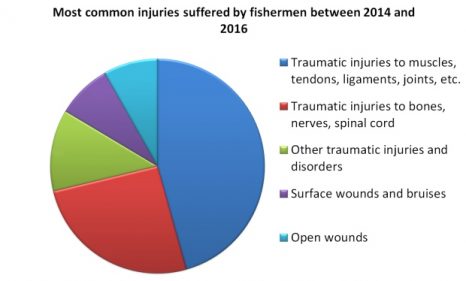
Nova Scotia’s deadliest industry slowly becomes safer
It is one of the most mundane tasks on a fishing boat: tying up the bumper balloons that prevent the vessel from crunching into the wharf when it docks. But for fisherman Mitch MacDonald it proved life-altering. For 10 years he fastened them with little problem. That is until last May, when his boat pitched unexpectedly and a balloon fell overboard, the rope sawing through his left index finger. “It pretty much burnt right through my finger and took the end of my finger off overboard,” he said. MacDonald has not regained the full use of his hand. The injury cost him thousands of dollars in lost income as he had trouble holding onto things and couldn’t work the rest of the fishing season. He is not alone. In 2016 there were 224 injuries on fishing boats, according to the Workers’ Compensation Board of Nova Scotia, but good news is the numbers are declining. Six years ago 351 injuries were reported. Read the story here 08:37
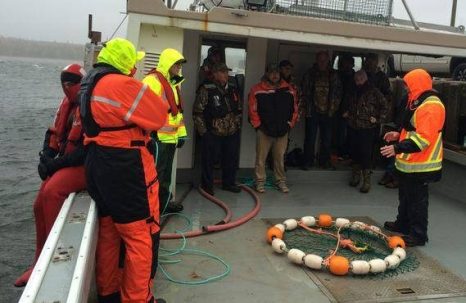
Putting safety at sea first with man-overboard drills
With the start of the commercial lobster fishery on the south shore just days away, safety at sea messages are being delivered to local wharves by the Fisheries Safety Association of Nova Scotia and industry partners through man overboard drills and demonstrations. “The overboard drills are done under the heading, Are you ready?” said Stewart Franck, executive director of the Fisheries Safety Association and a Canadian Registered Safety Professional (CRSP). “We want people to think as they are going through their vessels to check their safety gear, their safety equipment and safety supplies. Do a self-check on health and safety.” Make sure safety equipment such as life rings and overboard ladders are easily accessible and not entangled in rope or gear, advises Franck. “The first time you go to use it isn’t the time to find out that you can’t get at it,” he said. “You can waste valuable time getting to equipment.” Read the story here 09:29
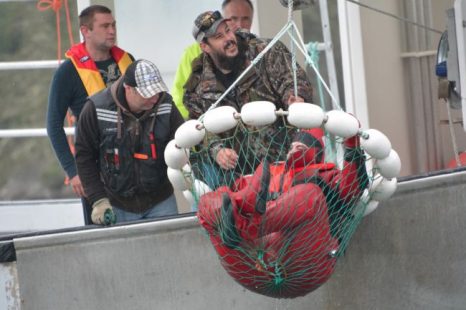
Fishermen urged to be prepared and train for emergencies even before leaving the wharf
When you’ve got someone overboard in the water, that’s not the time to find out you’re not prepared to get them quickly and safely back on the boat. It’s for this reason fishermen are encouraged to be prepared before even leaving the wharf. And it’s for this reason that man overboard drills have been held in some fishing ports in advance of the upcoming LFA 34 lobster season off southwestern Nova Scotia. “We call it ‘Are you ready?’ because as people are getting their boats and their gear and all of their equipment ready, we want them to also make sure all of their safety equipment and training and their crew is ready as well,” says Stewart Franck of the Fisheries Safety Association of Nova Scotia. “People need to be prepared in the event of an emergency.” Franck says PDFs are required to be worn and safety equipment needs to be on boats. Read the story here 11:18
NSCC School of Fisheries providing education, training and safety
 YARMOUTH – When Marcel d’Entremont starting fishing on a fish dragger in 1981,, “My safety training was this: the owner of the boat looked at me and said, ‘The life raft is on top of the house, the immersion suit in the bow is mine. Don’t touch it.’” Read the rest here 09:13
YARMOUTH – When Marcel d’Entremont starting fishing on a fish dragger in 1981,, “My safety training was this: the owner of the boat looked at me and said, ‘The life raft is on top of the house, the immersion suit in the bow is mine. Don’t touch it.’” Read the rest here 09:13







